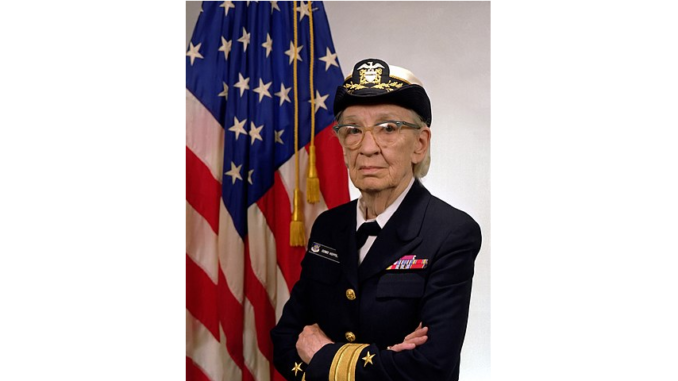
Grace Hopper (née Murray, 1906-1992; age 85), was the eldest child born to a New York City family that excelled in mathematics. Her father owned an insurance company, which of course involves statistics, mathematical probabilities, and tables of data. Her mother was good at math, too, despite the fact that women of that generation were actively discouraged from studying mathematics. An insatiable curiosity frequently led Grace to disassemble gadgets, both mechanical and electrical. After taking apart seven of the family’s alarm clocks at a very young age but not able to reassemble them back to working order, Grace’s mother forbade her to tinker with any alarm clock again – save one, which she was given to figure out what made them tick.
Grace entered Vassar College in 1924 at age 17 and graduated in 1928, Phi Beta Kappa, with degrees in mathematics and physics. From there, she went to Yale, earning her masters degree in 1930 and a PhD in mathematics in 1934. While working on her doctorate, she simultaneously taught math to undergraduate students at Vassar. Much later in life, she reflected that teaching young people was her greatest role: “If you ask me what accomplishment I’m most proud of, the answer would be all the young people I’ve trained over the years; that’s more important than writing the first compiler.” Notably, she also said, “I’ve come to feel that there is no use doing anything unless you can communicate”.
Upon completion of her graduate work, she continued to teach at Vassar College for nearly another decade. However, Grace became fixated on a Navy career after Congress opened a door for women by establishing the Navy Women’s Reserve and the WAVES (Women Accepted for Volunteer Emergency Service) in 1942, as a result of the attack on Pearl Harbor. Her inclination towards Navy service may also have had something to do with her great-grandfather, Alexander Wilson Russell, an admiral in the US Navy during the Civil War who fought in the Battle of Mobile Bay and Vicksburg.
Grace attempted to join the WAVES in 1942 soon after the organization’s creation, but was rejected because, at 35 years old, she was considered too old for military service (similar to Henry Fonda’s situation), and because at 105 pounds and five foot six inches tall, she was 16 pounds underweight by Navy standards. Determined, Grace persisted. It took more than a year, but eventually the Navy agreed to grant her a waiver for her age and weight, and accepted her into midshipmen’s training for women in December, 1943, at Smith College, just in time to celebrate her 37th birthday. Six month’s of intensive training later, she graduated at the top of her class of 800, and received a commission in the US Navy Reserve as Lieutenant, Junior Grade. (She skipped over the rank of Ensign, because Navy regulations didn’t allow Ensigns of her age – again, similar to Henry Fonda).
Joining the Navy was a fortuitous move for Grace, which would lead her to fame and a multitude of honors. The Navy assigned her to a project taking place at Harvard University, involving an electro-mechanical device that was fifty feet wide, eight feet tall, and completely filled an entire room. It consisted of 530 miles of wire, 3 million wiring connections, and 750,000 relays, vaccuum tubes, and other parts. It was the Mark I Computer and it was built for the specific purpose of caculating ballistic trajectories for Naval weapons systems, all for the war effort. Grace would become an expert on the machine, both it’s hardware and software.
After the war, she turned down an offer from Vassar for a full professorship, choosing instead to remain in the Navy Reserve and to continue full-time in the brand-new field of computers. She stayed at Harvard for a few years on contract, working on the Mark II and Mark III machines. In 1949, Grace accepted a position with the company that would become Sperry Rand, helping to develop another famous early computer called UNIVAC (Universal Automatic Computer). At this time, in the early 1950s, she developed the idea that computers should be easier to use for ordinary people, and that they should be programmable in English, not just machine code. For this, she was met with a great deal of resistance. Her colleagues told her it would never work, it was impossible because computers don’t understand English. Grace had something of an indominatable spirit, so she went ahead and did the impossible. She created a program language that provided computer instructions written in psuedo-English that humans could understand, and another program (what is now commonly known as a compiler) which translated the psuedo-English into machine language that a computer could understand.
This was a huge breakthrough in efficiency. Grace’s human-readable program developed into COBOL, one of the most important and widely-used programming languages of all time.
People who worked for her and with her called her “Amazing Grace”, and affectionately, “Grandma COBOL”. Her abilities, accomplishments, and ability to communicate and inspire people have resulted in many honors. This article is too short to do justice to her story. I encourage you to read the links provided.
Grace served in the Navy for 43 years, not retiring permanently from the service until just shy of her 80th birthday. She worked for Digital Equipment Corporation until 1992, when she passed away at age 85. She was laid to rest in Arlington National Cemetery with full military honors.
Question of the Night: Which famous, or not so famous, person(s) do you admire?
